Samma Sankappa: Right Thoughts in Service to Buddhism
Anger is an object lesson, not just about hatred, but lust, craving and mindless passion. It feeds on itself until it destroys something. And that is implicit in the Buddha’s message, that these kileshas, i.e. defilements, feed on themselves. That is why Buddhist love is not the passionate kind, and even lovingkindness better be careful, that the passionate embrace of a babe in swaddling clothes stops well short of puberty, and so finds a larger audience in brotherly and sisterly love, instead of rape, pillage, and incest.
Words can do that, calm passions and waylay anger, though it can often create as many problems as it solves. The point is that it’s a tool, and that implies choice, and skill, in the manner of its execution. That is why they are such a double-edged sword, but a steel-edged sword at that, rugged and durable and thorough in its prohibitions. The only question is how to apply those prohibitions with justice and fairness and forethought in its planning.
If words can devote themselves, at the insistence of consciousness, to the cessation of anger and hatred, then it will go a long way toward solving the problems of the world. If that mission can be extended to lust, craving, and mindless passions, then it will go a long way toward solving the problems of the self. Because the problem of self is not just an abstract point of doctrinal dispute between Buddhists and Brahmins. It is a problem of selfishness in the lives of men and women. Lose the self and save the world.











Reply